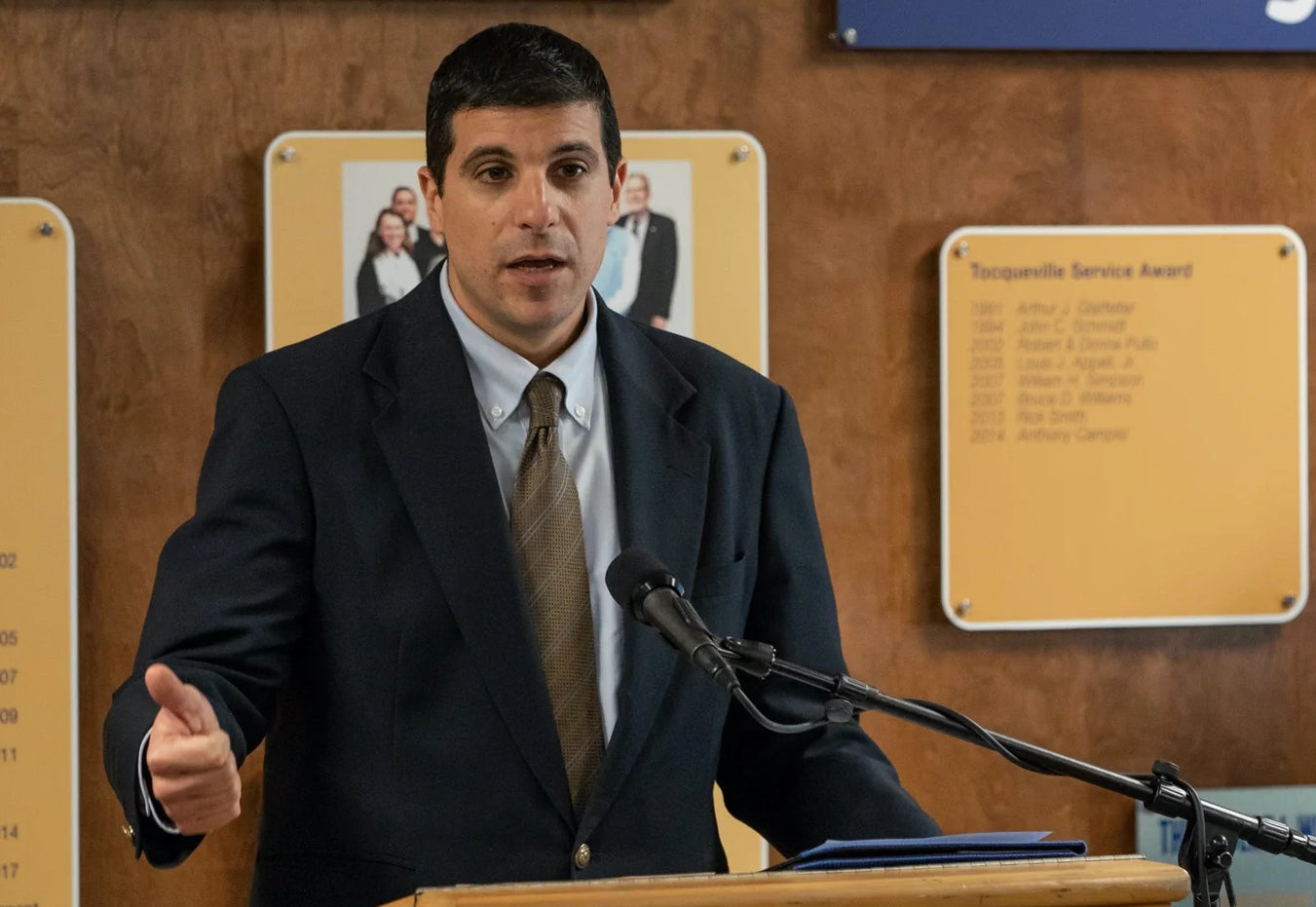Talk of lobbying against Cicero by utilities
The investor publication speculated Sunday’s win would likely mean a move to a “more moderate” Consumer Advocate.
“We view this as an indicator of the water industry’s strong political influence in Pennsylvania, which is a key factor that has enabled the state to consistently rank among the most attractive states for water utilities to do business,” Northcoast Research wrote.
The letter of support for Cicero includes signatures by the Pennsylvania Municipal Authorities Association, which represents more than 700 municipal authorities statewide, the publicly owned Chester Water Authority, the Pennsylvania Utility Law Project, Community Legal Services and several housing, health and environmental organizations.
In his resignation letter, Cicero said the “utilities’ actions” and Sunday’s decision to open the position to other candidates “cannot be separated.”
“Collectively, they challenge the integrity and independence of the office and erode the public trust in the impartiality of the regulatory process and signal a concerning shift, where public accountability and consumer protection are subordinate to corporate interests,” Cicero wrote.
Sunday’s statement did not directly address these allegations, but said his administration will prioritize “having a capable, unbiased and apolitical” Consumer Advocate to protect the interests of consumers.
“Its work is vital to all Pennsylvanians, especially the most vulnerable among us,” Sunday said. “I look forward to an open and transparent process that includes feedback from all interested parties and individuals.”
A spokesperson for Sunday’s transition team declined to answer questions about whether utilities had asked Sunday to replace Cicero.
Several utilities are represented on Sunday’s transition committee. Members include David Kralle, a registered lobbyist for Peoples Gas, Aqua Pennsylvania and parent company Essential Utilities; David Fisfis, general counsel and vice president of energy policy at Duquesne Light Company; and Carolina DiGiorgio, vice president of government and external relations at PECO.
Sunday is also inviting consumer advocacy organizations to join the transition committee and seeking feedback on what to look for in the next Consumer Advocate, he said in his statement.
PECO and Duquesne Light did not respond to a request for comment.
Aqua America declined to comment on Cicero’s resignation as well as on Kralle’s participation in Sunday’s transition committee.
In a statement, American Water said it was not involved in the process.
“Pennsylvania American Water is committed to transparency and maintaining the trust of our customers and stakeholders,” spokesperson Gary Lobaugh said in an email. “Pennsylvania American Water has not been involved in any efforts to influence the selection or retention of the Consumer Advocate. Our focus remains on providing reliable and high-quality service to our customers, and we respect the independent processes that govern the appointment of the Consumer Advocate.”
A Consumer Advocate who scrutinized the water sale process
Acquisitions of aging municipal water supplies by investor-owned utilities are increasing across the United States and in Pennsylvania as some municipalities struggle to upgrade infrastructure to meet new drinking water standards.
But purchases of municipal systems by companies often come with a higher cost to consumers — something Cicero has not been quiet about. Several states, including Pennsylvania, have passed fair market value laws, which allow companies to factor in the potential future value of a utility when purchasing it, pay above the price and essentially recover the cost of inflated acquisition prices through rate increases.
A Cornell University study of the 500 largest community water systems in the U.S. found that Pennsylvania has some of the highest utility bills following privatization.
Investor-owned utilities often argue privatization is necessary to “save” struggling municipal-owned systems. Though Cicero does not oppose privatization when necessary, he has argued Pennsylvania’s fair market value law allows companies to purchase “perfectly viable” systems for the sake of making more money.
“We are not anti-privatization, and we are not against well-thought-out consolidation and regionalization,” he said during a 2023 state House committee hearing on legislation aiming to amend the state’s fair market value laws. “What we oppose is privatization for its own sake — and privatization and consolidation at any cost or regardless of the cost to consumers.”
On a number of occasions, Cicero has pointed to dramatically increasing water and wastewater costs in Pennsylvania. In fact, fair market value laws have cost consumers more than $85 million more each year than they would have paid without the law.
Cicero’s Office of Consumer Advocate has settled several privatization cases before the PUC, essentially agreeing to allow them to go forward. But he has thrown a wrench in at least two.
In 2023, the Pennsylvania Commonwealth Court sided with Cicero and reversed the Pennsylvania Public Utility Commission’s approval of Aqua Pennsylvania’s purchase of East Whiteland Township’s sewer system for nearly $55 million. Cicero argued the PUC failed to prove the acquisition would provide a public benefit, and that it would raise wastewater costs for thousands of ratepayers.
Early last year, when Pennsylvania American Water applied to the PUC to buy the borough of Brentwood’s sewer system, Cicero urged the commission to approve the application only if it would provide “substantial, affirmative benefits to the public.” He argued PA American had not met its burden of proof that the acquisition would benefit the public interest. The PUC ultimately denied PA American’s acquisition request.



















/cdn.vox-cdn.com/uploads/chorus_asset/file/25822586/STK169_ZUCKERBERG_MAGA_STKS491_CVIRGINIA_A.jpg)

/cdn.vox-cdn.com/uploads/chorus_asset/file/25821992/videoframe_720397.png)




/cdn.vox-cdn.com/uploads/chorus_asset/file/23935558/acastro_STK103__01.jpg)